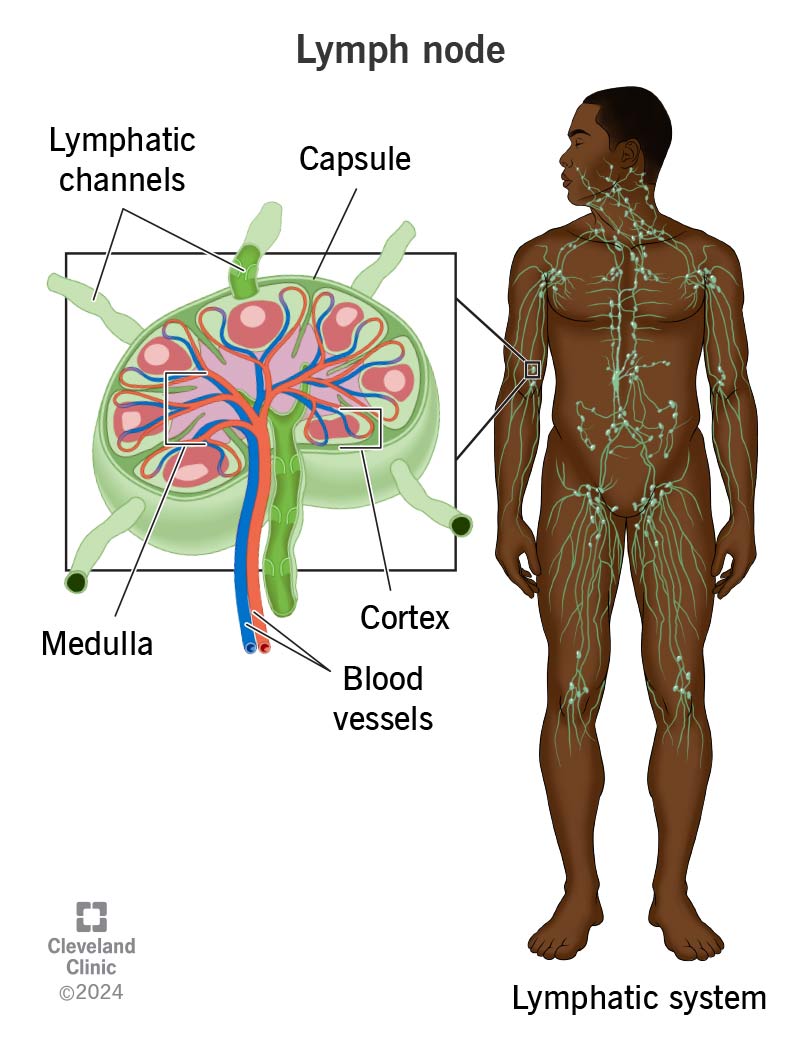Lymph nodes are small, bean-shaped organs that are the size of a pea. You have nodes throughout your body including in your armpits, neck and groin. Your lymph nodes can swell or get bigger, which is a sign that your body is fighting an infection or an illness.

Lymph nodes are small, bean-shaped organs that filter substances in your body. Cells that help fight infections make up your lymph nodes along with lymph tissue. There are hundreds of lymph nodes throughout your body. The most well-known places where you’ll find lymph nodes are in your armpits, neck and groin.
Advertisement
Cleveland Clinic is a non-profit academic medical center. Advertising on our site helps support our mission. We do not endorse non-Cleveland Clinic products or services. Policy
A lymph node’s job is to filter substances in your lymph fluid, which is a collection of fluid that drains from your cells and tissues. Lymph fluid contains:
Lymph fluid flows through the tissue that makes up lymph nodes, where the tissue filters and recycles lymph fluid that your body needs. The cells within your lymph nodes will attack, destroy and eliminate waste, especially foreign invaders, to help your immune system keep you healthy.
Your lymph nodes work closely with two body systems including your:
As a filter for the fluid that flows through your cells and tissues, lymph nodes clean up and get rid of lymphatic fluid waste and invaders that cause illness, while holding onto the components of your lymphatic fluid that keep you healthy.
Advertisement
Lymph nodes exist throughout your body. They normally reside where two or more major blood vessels come together (converge) on your body including:
Lymph nodes look like sprouting kidney beans, where the sprouts are tubes that carry lymphatic fluid around your body (lymphatic channels). Leading into each node are blood vessels. The lymph node has a protective outside layer (capsule), like a shell on the bean that divides parts of the node into rooms with a large open room in the center (cortex). Lymphatic fluid flows through these rooms, which filters the fluid, and it exists in the nodes from the lymphatic channels.
Advertisement
Lymph nodes are about the size of a pea, which is less than 1/2 inch. (12 millimeters).
There are approximately 600 lymph nodes in your body as an adult. The exact number varies from person to person.
Lymph nodes are made of lymph tissue and different types of cells including:
Several conditions affect the health of your lymph nodes including:
Symptoms vary for each condition that affects your lymph nodes. The most common symptoms arise with swollen lymph nodes (lymphadenopathy). Symptoms of swollen lymph nodes include:
When lymph nodes swell, that's your body telling you that you’re fighting an illness or infection. If you notice your lymph nodes get bigger and you don’t have symptoms of an illness or infection, visit your healthcare provider for an exam.
Your provider will check the health and size of your lymph nodes through imaging tests like:
A complete blood count is a blood test that measures how many cells are in a sample of your blood. This can help identify conditions and/or cancers that affect the cells in your lymph nodes.
If you have severe symptoms that affect your lymph nodes, your provider might perform a lymph node biopsy where they remove a small tissue sample of one of your lymph nodes to examine the lymph tissues for abnormalities.
Your provider will diagnose and offer treatment that is unique to you and your symptoms. Treatment for common lymph node conditions varies but could include:
You can take care of your lymph nodes and your lymphatic system by:
A note from Cleveland Clinic
Your lymph nodes are an important part of your body that filters substances to keep you healthy. Taking good care of your body helps your lymph nodes and your lymphatic system work at its best. Talk to your provider if you notice your lymph nodes get bigger or swell, which could be a sign of an illness or an infection.
Last reviewed on 05/31/2022.
Learn more about the Health Library and our editorial process.
Advertisement
Cleveland Clinic is a non-profit academic medical center. Advertising on our site helps support our mission. We do not endorse non-Cleveland Clinic products or services. Policy